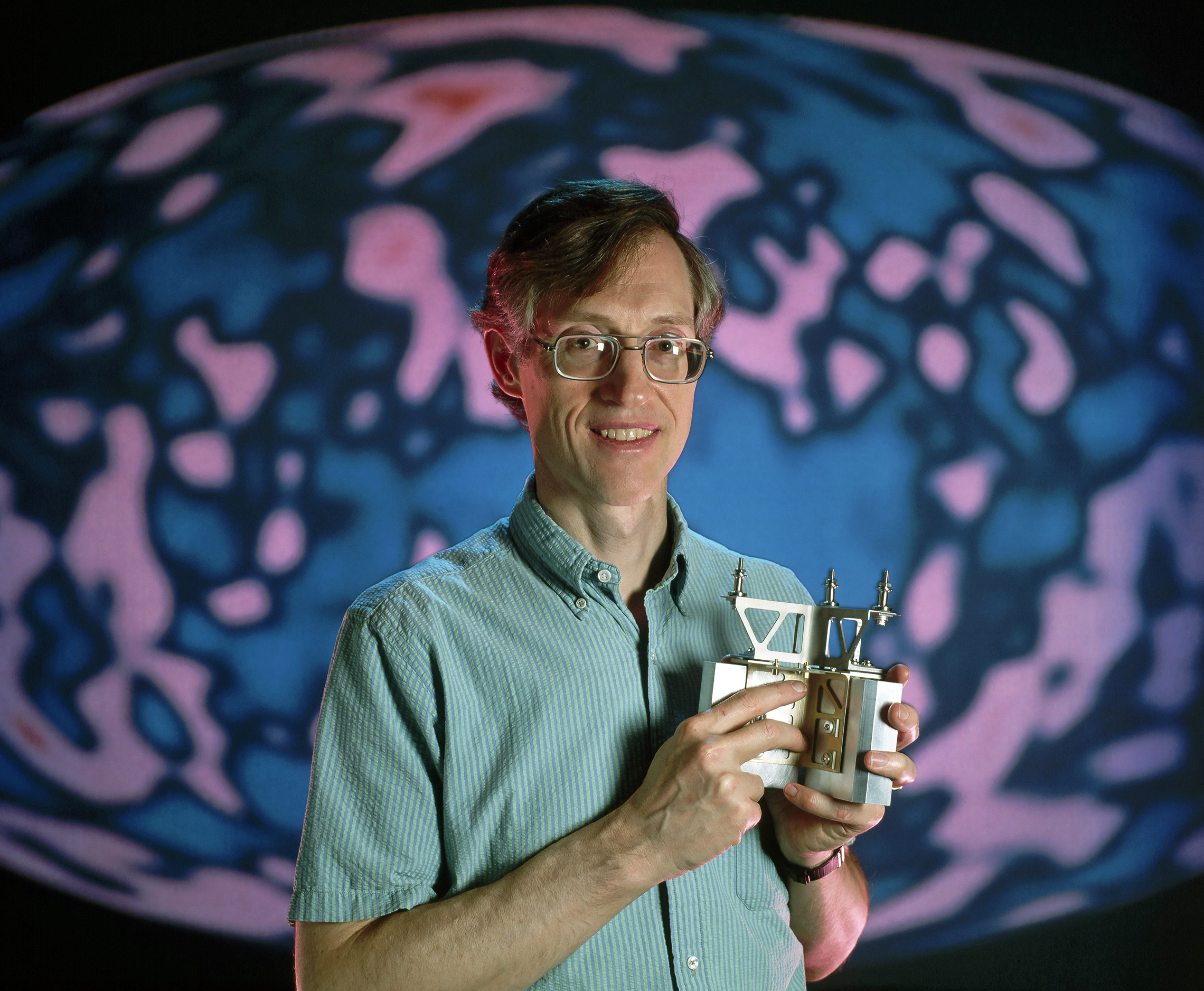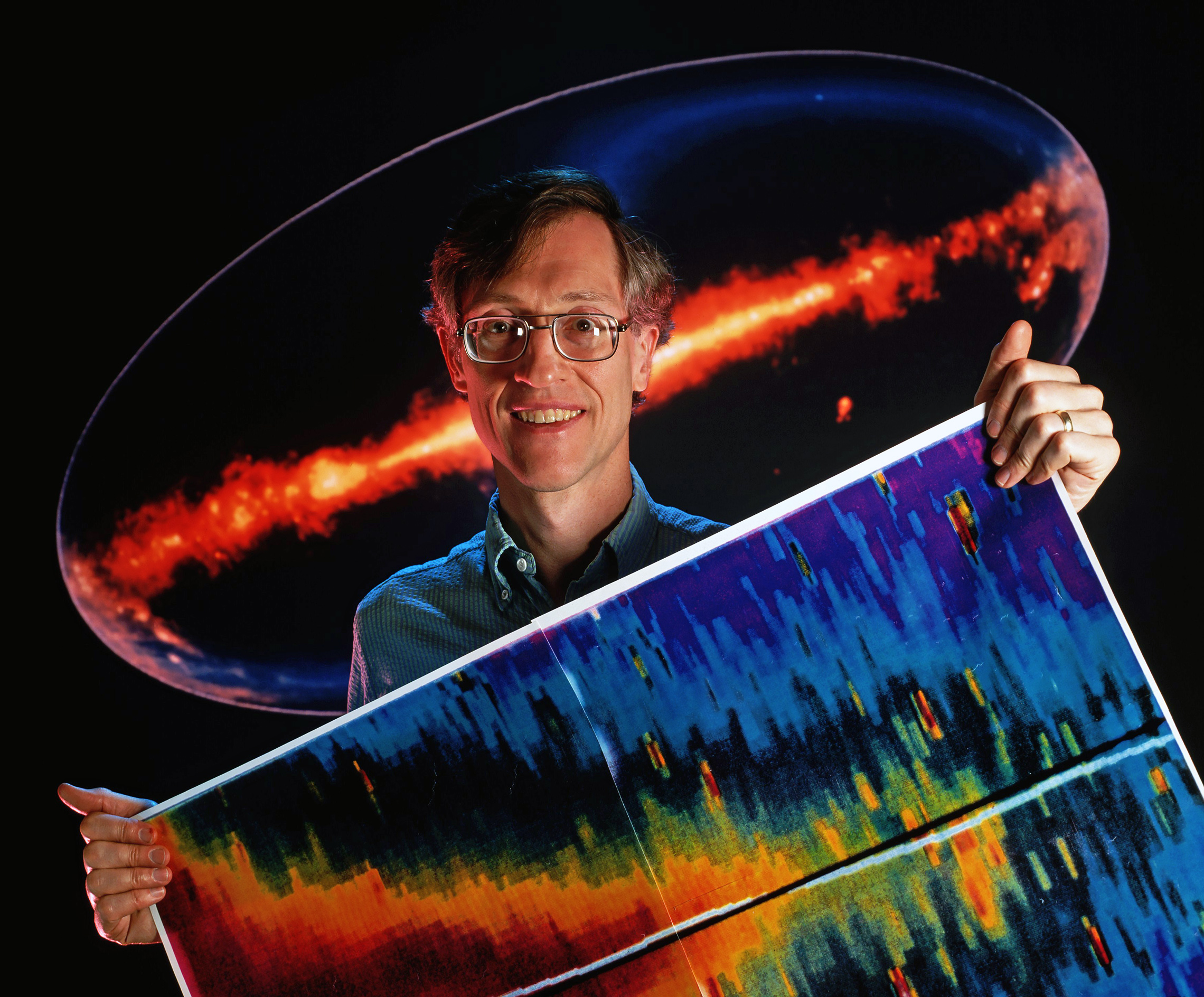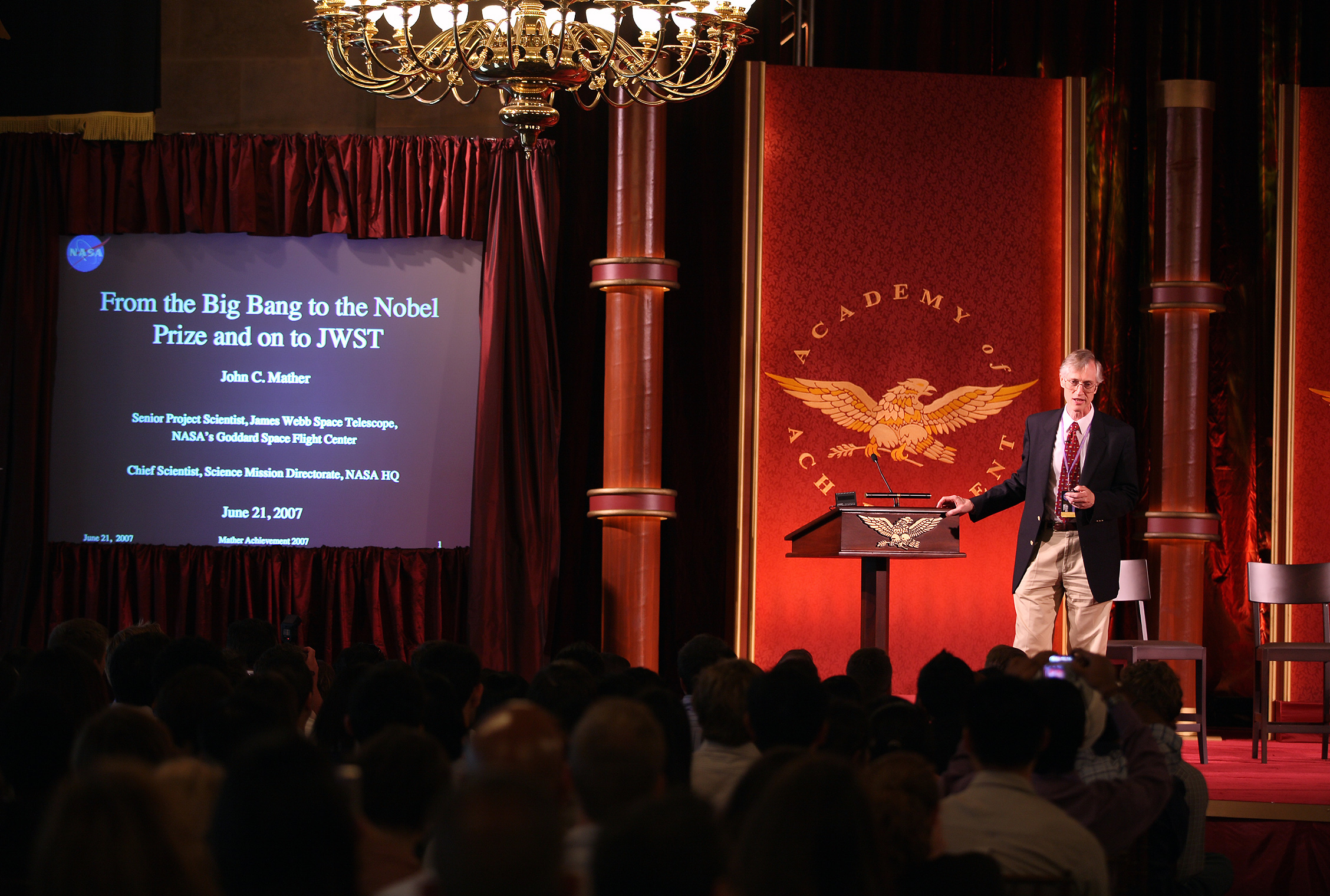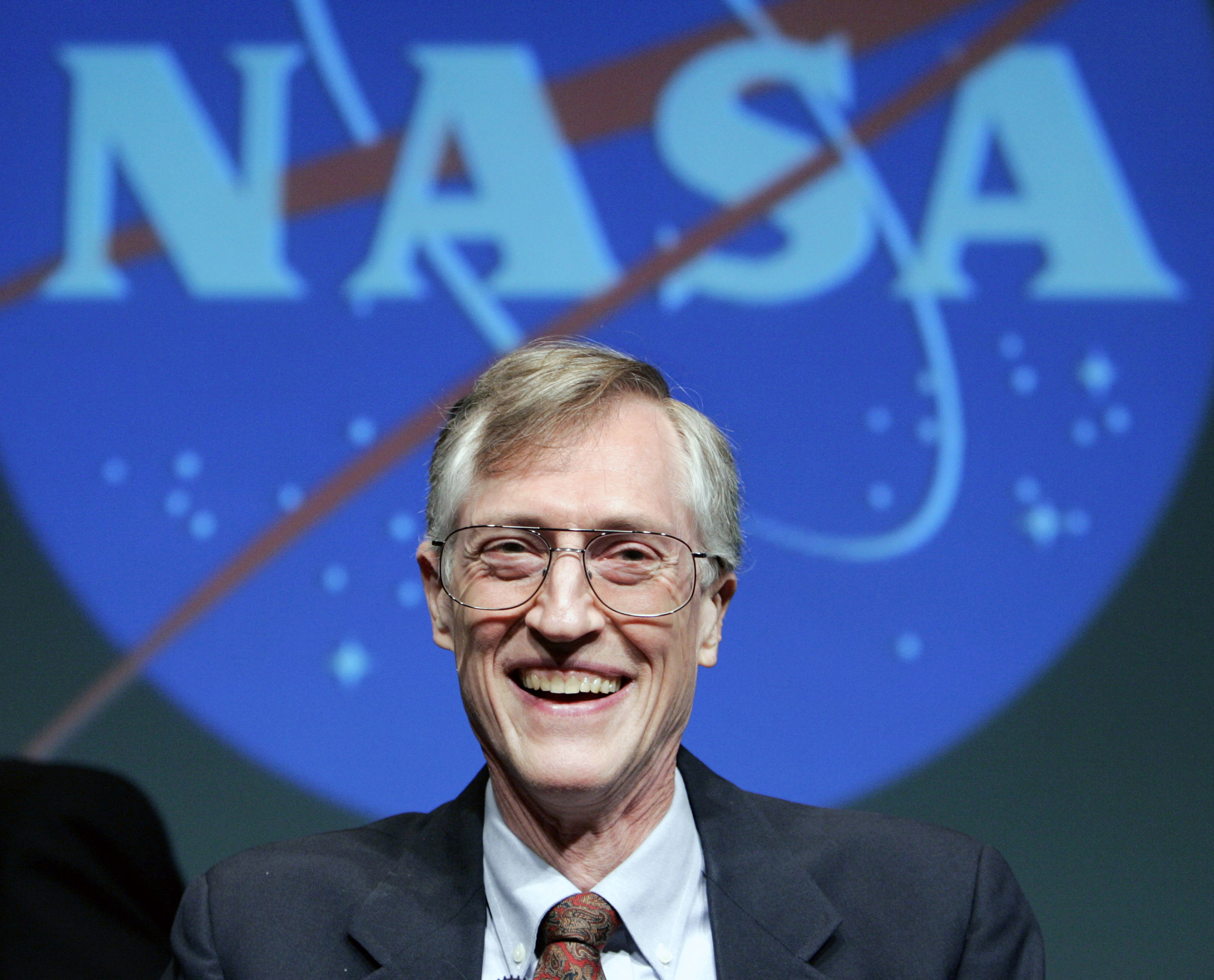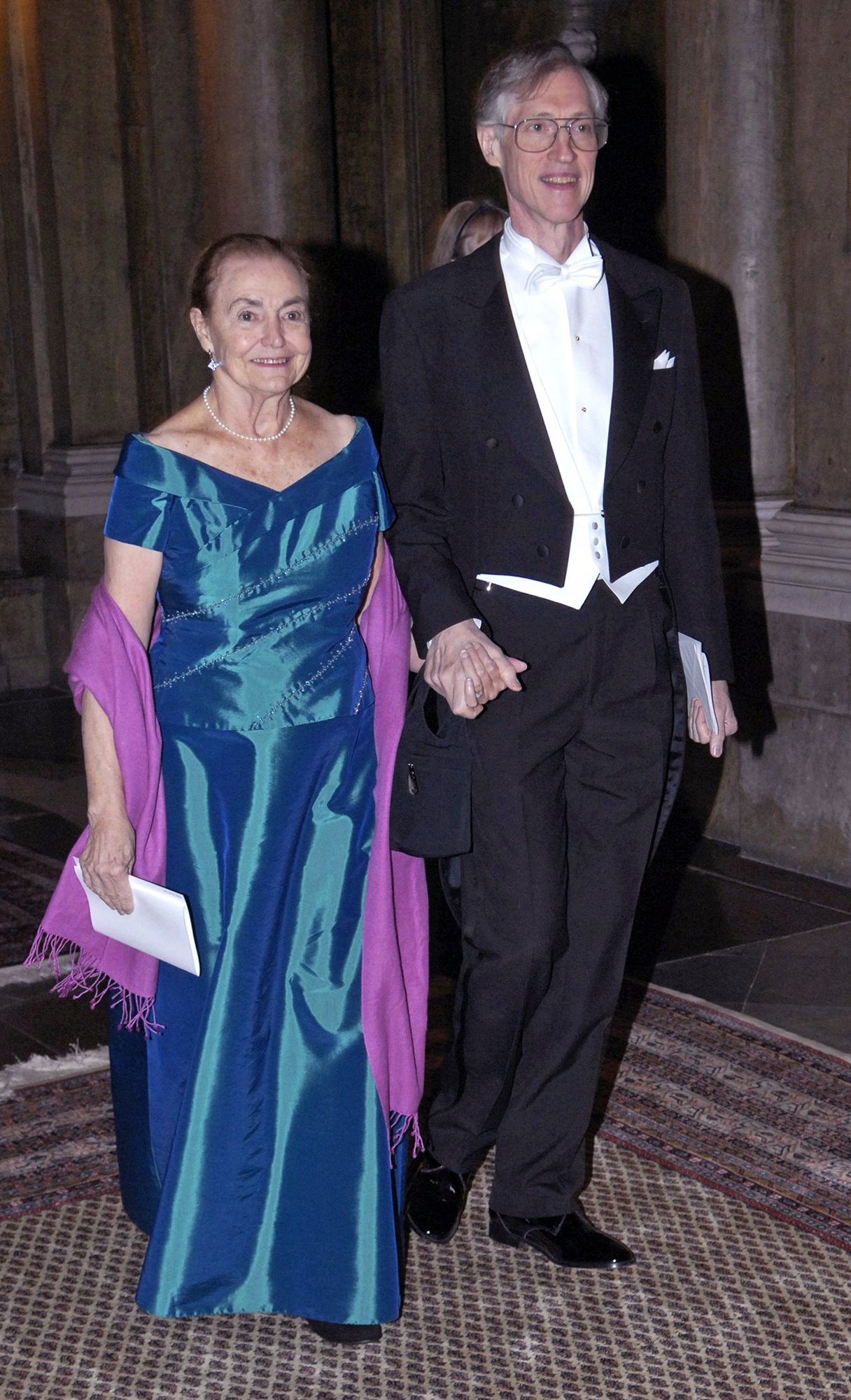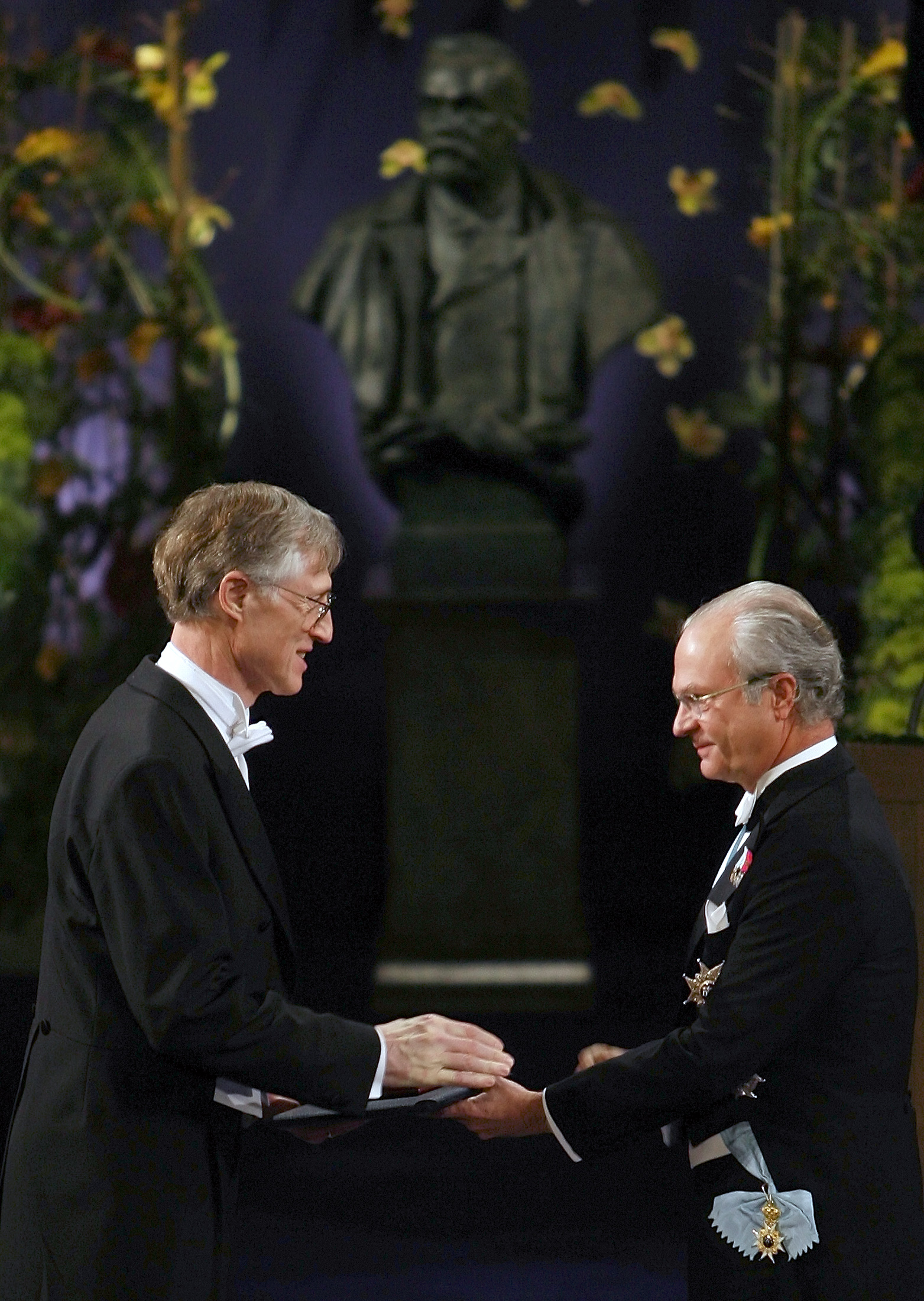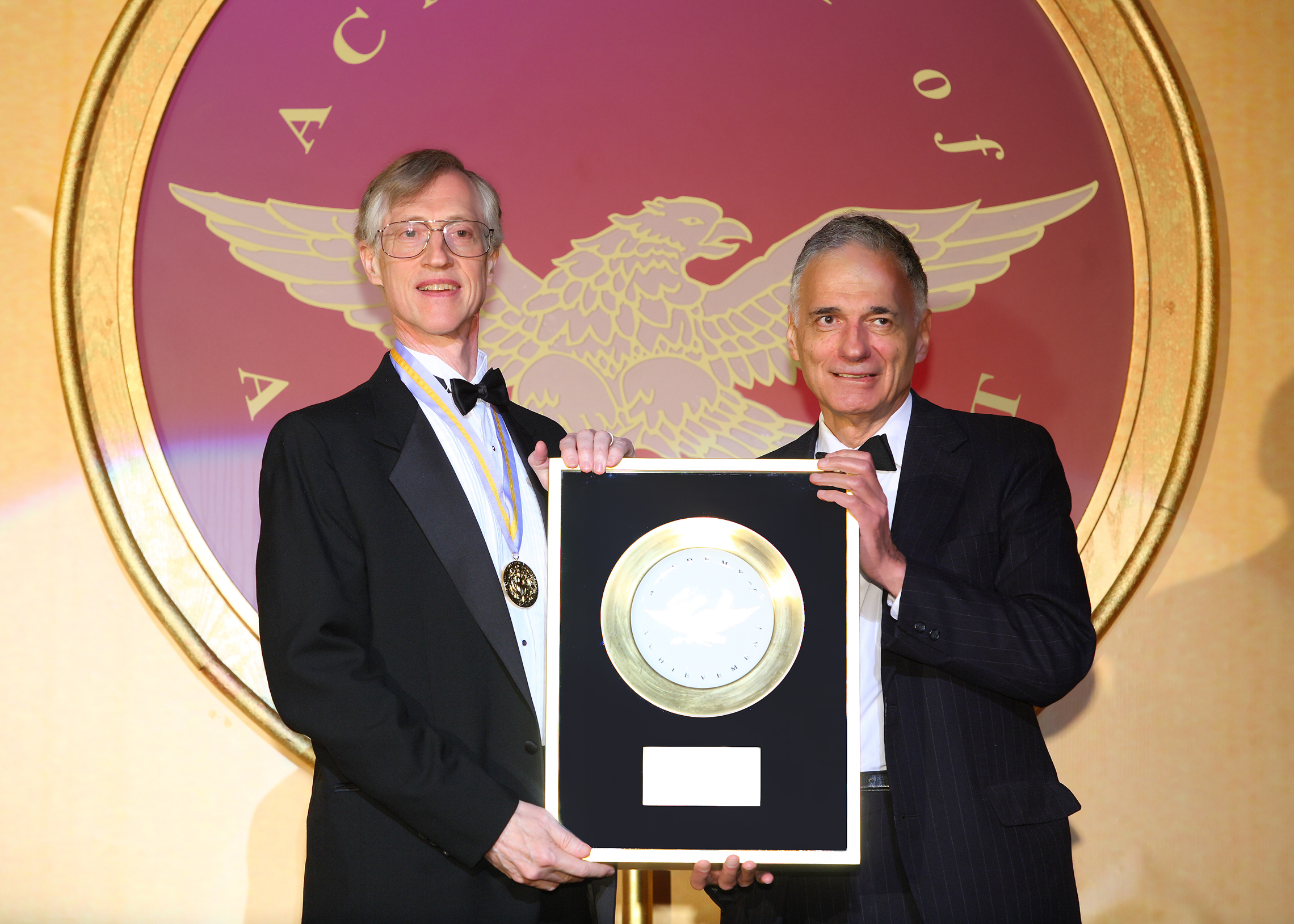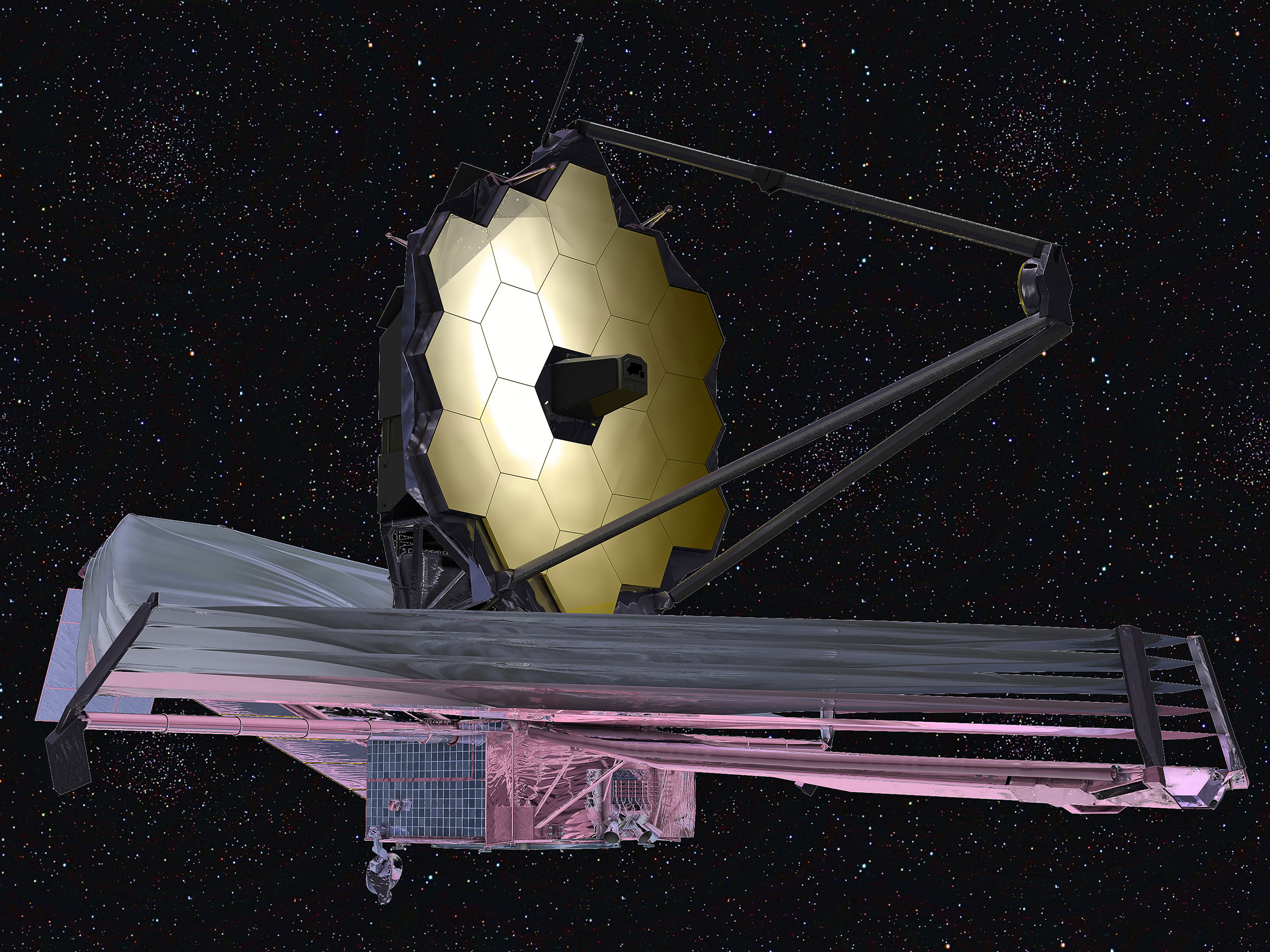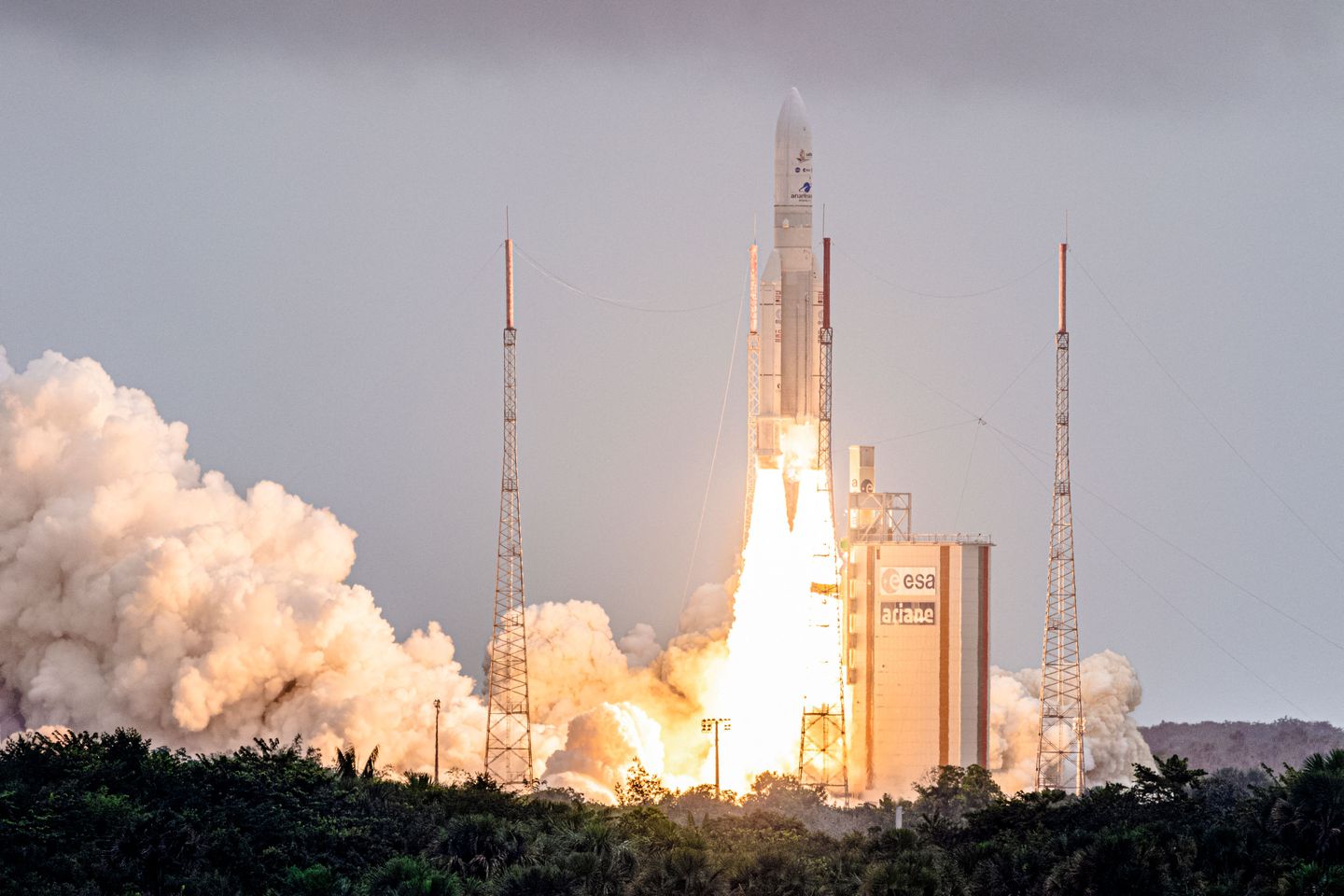What has really surprised you in your own study of the cosmos? Was there something that you never expected to find?
John Mather: I was surprised by the importance of the discoveries we made with the COBE satellite. The number one was within a few weeks after launch. I showed a graph of the cosmic background spectrum to the astronomers. I got a standing ovation for a graph! And I really didn’t think I would. I thought, “Doesn’t everybody know that’s the right answer?” I knew it was the right answer because I’d seen it, but they didn’t all know.
We had some bad measurements. We had some really bad theories. And we had some serious doubt about whether our expanding universe story is correct. So now we know that one. When we designed the project the first time, we didn’t know that we would ever be able to find what we call the cosmic anisotropy, which is to say the map of the Big Bang radiation — the heat radiation — is not uniform. There are hot and cold spots on it which are not very bright and really hard to find. We didn’t know they’d be there. There was no serious theory to tell us they would be there when we conceived the mission. When we got the data, it was fabulously important, and I didn’t know how important it would turn out to be. I just couldn’t have guessed that. Now we know that Mr. Hawking was right. It really is the most important discovery of the century — if not of all time — for scientists. At least for cosmologists. So what it meant was now we can explain our existence. Those little hot and cold spots measure the details of the early parts of the universe. They tell us about the gravitation that was there then. They tell us about the gravitation that should cause galaxies to exist today. They tell us about the cosmic dark matter and the cosmic dark energy. All of those things have their effects on those patterns of little spots. No one knew in 1974, when we conceived this mission, that any of that could be done. Now it’s practically an industry. There have been now three space satellites, besides the COBE satellite, that were launched for this purpose. One came before, two after. And it’s still an extraordinarily rich subject. So I never guessed how rich a subject it would be. More papers have been written about those spots than there were spots on the map by far. So this is huge. I just never guessed.
Those spots tell us a great deal about the past. Do they tell us anything about the future?
John Mather: They do tell us about the story of the universe, and so they do confirm the other discovery — the one that got the Nobel Prize last year — about the accelerating universe. One of the reasons they could give a prize was it’s been measured more than one way. So the spots confirm that story. Okay, so the universe is accelerating. It means that distant galaxies are going away from us faster and faster. If you wait enough billion years, not only will the stars go out, but the galaxies will go away. So if you’re the one astronomer left in the universe, it will be very lonely. You won’t see a single other thing besides your own star and your own galaxy. So that’s something that we can tell is probably coming if our story is correct, which I can’t promise.
Looking out at the universe, do you think that there are other places like Earth, or are we unique?
John Mather: I feel sure that there are other places like Earth. I also feel sure that we are unique. And I feel also quite sure that we will never find signals from another civilization, just because the universe is so large and it’s so difficult to hunt through it. I feel sure there are other civilizations, but just that we can’t find them. So we sort of know these things just from the large numbers. Carl Sagan explained it all very well many years ago. I think he was right. So we’re on our own. It’s our job to preserve our civilization, expand it as far as possible, conceivably even to build a robot that can travel to another star and set down and land on a planet out there. So it’s going to have to be a pretty smart robot and it has to be pretty patient. But it’s not impossible as far as I know. It’s pretty hard for us to go there, but it’s possible to build a robot to go there. So we’re thinking.
How much of a role does the creative process play in what you do? Obviously there are physical and mathematical components that are fixed. But in terms of understanding those or putting them together in new ways, does the creative process play a role?
John Mather: It seems to me that the life of a scientist is all about the creative process. People think, “Scientists are so smart, they must know a lot.” That’s really not how it feels to be a scientist. How it feels to be me, and I think to my fellow scientists, is we’re always working on the part that we don’t understand yet: the equipment that doesn’t work right, the theory that doesn’t function right, the algebraic mistakes that we haven’t found yet, the computer program that doesn’t work right yet. We spend relatively little of our time thinking about the stuff we already know. It’s all about the creative process for understanding what we don’t know. So we’re on this huge quest. Personally, a lot of my creative moments come from conversations with other people. Someone says, “Well, I could do this…” and I say, “Well in that case, why don’t we try that?” So at least two major concepts for observatories have come from concepts that I’ve been discussing with friends. So that’s part of how creativity occurs, is somebody offers you a problem and you say, “I could solve that,” or vice versa — challenge other people to solve a problem.
Are there other disciplines, interests or hobbies that nourish your scientific creativity?
John Mather: I read a lot of things outside my area of science. I’m so excited to read about what the biologists are finding these days. It’s such an enormously productive subject. I love reading Popular Science and Scientific American, and magazines that tell me what other scientists are doing, in a way where I don’t have to go into the detail and I get the inspiration of it. Those are things I like to pursue. I like to keep up with current events and understand the chaos of the world as well. Partly, I’m just curious. Partly, I’d like to have some influence, if I could understand what to do.
Were you always curious? Were you curious as a child?
John Mather: So I’m told. I’m told I was curious enough to get all the doorknobs off the house when I was three. So I figured my parents knew something was going to happen. I do remember being curious as a child, being interested in everything that I could understand, and I read a lot of books. I had a very quiet childhood, in the sense of growing up in the country on a research farm for Rutgers University. After a while, the county library started sending around a library bookmobile. So a truck full of books came every couple of weeks, and I would get everything I could about science. So it was an interesting time to be a child, and to read about things, because that was also right around Sputnik time. So we go from, “Well, it’s cool to be a kid interested in science,” to being, “Gosh, you could save the country when you grow up!” So that was a very exciting time too. It wasn’t only just curiosity, but I loved the curiosity part.
Was there anyone in particular who inspired you when you were young or fostered your interest in this direction?
John Mather: I think my parents had more to do with it than most people. They made sure I had opportunity to do things. And when I wanted to accomplish something, they would usually help a little bit. Now they didn’t have that great of resources either, where we were in the country. You couldn’t just go down to the shop and buy a lens. But when I wanted something, they usually figured out how to get something for me. They made sure I got off the farm to go away for summer camps in science a couple of times. That was cool. And they found ways to get me off to summer science programs in high school too, twice. So these were enough of an adventure outside my home district to find out, “Yeah, I have other friends like myself. I’m also pretty good at what I do.” So that was tremendously important actually. You have to discover you can accomplish what you want to accomplish to give yourself the courage to continue, because otherwise you could just get frustrated and give up. There were times that things were pretty hard to do, and I was thinking, “How is this going to go?” But I would remember, “Yeah, I’ve done hard things before. Maybe I can actually do this.” Some people have to discover their courage in that way.
Were you thought of as a gifted child, or as more of a curious one?
John Mather: I don’t know how people felt about me. I actually got to see my high school math and physics teachers again a few years ago, and they sort of knew that I was a special person, but they didn’t let on while I was there. They didn’t treat me as though I were super-special. They were just sort of, “Let John do what he wants.” My parents told me, “When you go to college, you’ll find out there are other people just as smart as you. You’re going to have to work hard.” That was their advice. It was true.
How would you explain — to someone who knows nothing about your field — what makes it so exciting to you?
John Mather: To me, the excitement is that we have a chance to really understand our human history. I think that’s exciting. Other people seem to also, although they concentrate on other things like genealogy and human history. I like to reach back as far as possible, because there are so many discoveries currently being made about the nature of the universe, how the physical universe has been expanding all these many billions of years, and how stars and galaxies are formed from that. We’re even beginning to learn how the Earth comes to be, how common are planets around other stars. To me, this is a fascinating story, and I think the public is interested too. So it’s not just because I’m interested. It’s because I can tell other people care about this also. There are even a lot of people who care because they already disagree with the story, but they care. So I take that as a tremendous vote of how important it is to people.
What do you see as the next great challenge or frontier in cosmology?
John Mather: I think the thing that I’m working on is one of the great frontiers. It’s the new telescope — it’s called the James Webb Space Telescope — which will be able to observe things farther back in time than Hubble can see, and to see inside dust clouds where stars are being born today. There’s a new star being born more or less once a year in our Milky Way. It would be pretty cool to watch that happen, because maybe we’d understand how the sun was made. We’re finding more and more planets around other stars, so we hope to learn something about whether ours is in fact unique, like we were speculating before. So to me, this is a fascinating set of things to be working on. So it’s one of the — this is an observational frontier. We’re building a new tool. And in truth we don’t really know what they’re going to find. One of the great confident hopes that we have is that there will be a big surprise there — that we will not predict everything. That seems to be the nature of astronomy. We almost never predict what we’re going to see and get it right. There were so many wonderful predictions made before the Hubble telescope was launched and so many of them were wrong, it was great. And basically almost none of the predictions that people made about exoplanets — the planets around other stars — almost none of those were right. So it’s been almost entirely determined by observing. So it’s full of surprises. And my perspective on that is getting to be, “Well, if you can imagine it, it probably happens somewhere.” So we are limited by our imagination and we should expect surprises.
How do you see back in time?
John Mather: We see back in time really easy. I see you as you were about four nanoseconds ago. Light travels fast, but its speed is not infinite. So if we look at something that’s really far away, we see it as it was. Very simple. So if you see the middle of our own galaxy, it’s about 25,000 years ago that it had to send the light to us. If you look at something like the Andromeda Nebula, several million years ago as it was. If you look at the farthest things you can see, it’s 13 billion years. You’re looking back in time already, and that’s almost all that there is –13.75 is the estimated age of the universe. By the way, the cosmic microwaves that we measure, they show the universe as it was when it was only about 400,000 years old. We have its baby picture, and we’d like to know, “How did that work? How did it grow up?”
What was the impetus behind coming up with an idea like the Big Bang? What’s the thought process that goes into that? Is there a decisive moment when an idea like that comes into focus, or is it more of a cumulative process?
John Mather: I think the recognition of the expanding universe was somewhat sudden. On the other hand, the evidence was building up over time and — I expect — in the early part of the 20th Century. First it was necessary to find out what galaxies are. And they found the distant galaxies actually have stars in them. Then the next question was, “Are they moving?” And they seem mostly to be moving away. Then the next question is, “How far away are they?” And people started to get measures and especially Edwin Hubble got measurements of this. Then in 1929 was the big “Aha!” moment, because he made a graph, and he showed about 20 or 30 galaxies, and he showed that there’s this trend that the farther away they are, the faster they’re going. And it’s a pretty good trend. So, okay. Now maybe this is true. Now I see the universe is expanding. So this was the sort of sudden moment. People had predicted it. Two theorists had predicted it, and Einstein said it can’t be right. But then it was right, so that was a big “Aha!” moment for science, but it was something that developed over time.
By the way, we still call it the Big Bang, but we really shouldn’t. We should be calling it the expanding universe. And the reason that I say that, is that people immediately picture a little hand grenade going off when you say a Big Bang, and what we actually mean is the universe is expanding. We did not see a bang. It did not have a start that we can see. We know that the clock hasn’t ticked very long. It’s ticked for 13.7 billion years. But we do not see the moment before that. We do not see that event. We see the universe as it was when it was young. We don’t see it being born. That’s a pretty big thing we have to think about, but so far all we have in science is the process for one thing turning into another. We don’t have anything that says, “There was nothing, and then there was something.” It’s curious, because almost all of the public thinks we mean something else. But we don’t. We mean we see the expanding universe, and we trace its history back. We do not see that it comes into existence.
Can we predict the lifespan of our sun?
John Mather: We can predict the lifespan of our sun. It’s been going for four-and-a-half billion years about, and it’s got another billion or so before it’s too bright for us to live here. When it’s another five billion –roughly — from now, it will be expanding to the size of the Earth’s orbit roughly, and it will be turning into what we call a “red giant star.” After 7.6 billion or so, that’s over too and it will shrink down to become a white dwarf star. So that means its nuclear interior fuel is used up. It will get fainter and cooler over many billions of years. So that’s probably its life cycle. So maybe we get some space travel before that.
Then what happens to our solar system?
John Mather: Our solar system will continue orbiting around our galaxy for a few billion years. But it’s an interesting question, because in about two billion years — maybe three or four, but soon anyway in cosmic terms — the Andromeda Nebula is coming at us. It’s that big beautiful thing you can see with binoculars in the autumn sky, over in the east. So it’s coming towards us. When galaxies collide, the parts go flying every which way. Stars mostly do not collide with each other. The planets are not likely to be ripped away from the sun. But the sun could be flung off into intergalactic space. As I like to say, we could get voted off the island. Now it will be pretty spectacular to be there as a witness, because cosmic collisions will occur, and the black holes that are at the middles of the galaxies — they will probably have a merger event — will be spectacular. So something amazing will happen. We can only tell this is likely because we measure the velocities. The Andromeda Nebula is coming towards us. We see what happens when other galaxies collide, because we can take their pictures out there. We even make movies of what it should be like, because we can simulate everything in computers now. So it’s spectacular even just to watch the movie.
Did ancient civilizations — like Ancient Greece or Ancient Rome, which didn’t have the benefit of all the technology, and some of the math and the science — did they get things right about our cosmos that surprise you?
John Mather: Some of the Ancient Greeks were astonishingly thoughtful. So some of them knew the size of the Earth. Some of them knew the distance to the moon. There’s a small mechanism that was made, perhaps by Archimedes and his shop, which would calculate the motions of the planets as you would see them from here. It was a gearbox, like a giant clock. Probably some rich person ordered it. So they knew a vast amount about how things actually work. I don’t know whether any of them guessed that Earth was not the middle. There are certainly people that understood the process of change. There were people that had the idea of atoms, as you know, as the word is a Greek word anyway. Some people really got it pretty good all along, considering how little they had to work with. But then it’s a little bit of a mystery to me how come such things slowed down as much as they did between, say, the beginning of the Roman Empire and its decay. Then some science went into hibernation, and some was probably being done and was being lost. So then we have this amazing flowering all over again in the late 15th and beginning of the 16th centuries, where suddenly science takes off. And who knows why that was? But it did.
What so far has been the most interesting or exciting moment in your career?
John Mather: I think, in a way, the most exciting moment is seeing the rocket go up that carried the COBE satellite into space, because, you know, we’d worked for 15 years to make that happen. And you realize, as you’re watching it, that there’s nothing you can do if there’s a fault there in the rocket. So you just say, “Well, hmm, I hope that works.” Of course, it’s four or five o’clock in the morning. You’re standing out in the middle of a field on the California coast and thinking about your future and what happens. So that’s exciting, and it’s also — when it works, of course — it’s a bit of an anticlimax. “Now what do I do?” Well, you know what you have to do. You have to head home and get ready to operate the observatory. But that was a pretty exciting moment, I have to say.
Once you’ve answered one question that’s puzzled you, where does the next question come from?
John Mather: In a way, the questions that scientists ask are community products. People are always asking questions, and most often we can’t work on them yet. But almost none of the questions that I’ve worked on were my idea. Almost all of them are just sitting there as challenges for all of us to think about. So what’s more likely is that scientists may have a personal idea about what to do about that. But the big questions have been sitting there a long time.
How would you describe your contribution to your field? What do you think you’ve brought to it that’s unique?
John Mather: The particular idea of the Cosmic Background Explorer satellite was one of my ideas. But is it really my idea? It’s hard to tell. Like I say, these things are community property almost. I happen to be the person who said, “My thesis didn’t work. We should have done it in outer space.” But in truth I wasn’t the first person to think that sort of thought. I remember a review committee came around to review my thesis project when I was at Berkeley. It was a NASA committee, and they said, “Why aren’t you doing this in outer space?” So it wasn’t really my idea alone. I just was the one that stood up and said, “Yeah, maybe we should try that.” So that’s an interesting thing because — so the ideas themselves are not so unusual. What I think was as important though, was I had somehow the ability and the team to work with to continue through until it worked, and that’s pretty special. And you can’t claim responsibility for that either. You go into an environment at NASA where there are many, many people that it takes to operate this system. In the back of our book about the Cosmic Background Explorer satellite are the names of about 1500 people. So they all worked on it. Many of them were completely essential, where if they hadn’t done what they did, it wouldn’t have worked.
How do you approach solving problems? Especially when you’re working with such large groups?
John Mather: Well, it’s pretty important to parse the problem out into parts if you can. If you want to, say, do you design a giant telescope? You have to describe what the scientific purpose is, what you want it to accomplish. Then you have to set up a process with an engineering team to say, “Let’s translate these wishes into drawings, concepts.” This is something called systems engineering. It’s a specialty in engineering to be able to translate the wish into the parts. So that’s one thing to do. Then another thing is, if you’re working on something — which I often did personally during the COBE project — say you’re sitting there with a problem that has to be solved, and you’re working with engineers to solve the problem. It’s been my faith that I’m not usually the one that knows the answer. Somebody sitting in the corner not saying anything could be the one that knows the answer to this one, and has been waiting for you to call on him or her to say so. So a lot of it is a group process management to encourage the people who could solve the problem to speak up. So it’s saying basically it’s a social endeavor. Science and engineering together are both. And very rare for a single person to do it alone.
What do you know now about achievement that you didn’t know when you were younger?
John Mather: I think when I was younger, I just didn’t know what I could accomplish. I didn’t start out with a plan to do anything particular. Most of my life was not planned in advance. I didn’t know where I was going to go. Mostly, I would say, my life strategy has been to respond to opportunity. And then when somebody gives you a responsibility, then stick to it. So it’s worked out. I didn’t have a plan when I left Berkeley to build this COBE satellite. In fact, I was going to do something else, because I thought it was too hard. But somebody said, “Well, write a proposal.” I thought, “Well, it’s pretty unlikely to be chosen, but it might be and that would be glorious.” So then when we got a chance to do it, of course I said yes. Then when it turned out to be a lot harder than people thought, well, okay, I’ll stay with it anyway. So I don’t give up. I think that’s part of the achievement. I think that’s what we’ve heard from a lot of the other speakers at this event as well today — that you just don’t give up. When something is hard, you just get more resources and keep on going.
What do you hope will be one of the big achievements of the next quarter century?
John Mather: I think astronomy will make huge progress. Biology is closer and closer to understanding detailed molecular approaches to managing diseases. I think that some of the big diseases of today will be mastered in some way. I think artificial intelligence will come along to be much more important than it is today. I think IBM’s demonstration of their Watson Program on TV was pretty spectacular. And I know they’re working on making it useful to people. So I think we’re going to see incredible growth of artificial intelligence and distributed computer systems to where they’re actually useful and it’s not just, “I’d like to look up something cool on Google.” I think maybe someday the computer will actually be able to help us think. It’s not impossible. It’s pretty complicated. As you know, it’s been in our future for a long time and it’s turned out to be much harder than the original proponents thought. But it’s not impossible, as far as I can tell. And I wouldn’t be too surprised if, say, in 50 years I could come in — if I’m still alive — and say to the computer, “Well, it’s time to go to Mars.” And the computer will say, “Okay, I know what to do.”
What can artificial intelligence do that the human mind can’t?
John Mather: It’s hard to tell what it could possibly do. What we know already is that it can help us represent our thoughts and it can help us remember what we thought before.
One thing we don’t have as far as I know in engineering is a kind of archive, or a library of all the successful things we’ve ever done. If somebody says, “I need to have a ball that spins in space, so how do I lubricate it?” you would think that by now a computer could say, “I know how to do that because it’s been done before,” and it would show you drawings. As far as I know, it’s not available. But why couldn’t it be? So if we need to send people to Mars, we need something that’s at least that helpful, otherwise it’s just too hard. So I think that’s a way in which even elementary artificial intelligence could be extremely helpful to us. Another application would be — if we have enough of it, we can send it to Mars by itself. “Okay, Mars Rover, drive around by yourself and find something interesting.” As compared to waiting for us to send a command every day to please go another few feet. So there’s a huge amount that’s possible, with even a little bit of improvement, of autonomy for our remote roboting sensors. So I think there’s a lot of possibility there. It’s pretty hard to do, otherwise we would have done it. But I think it’s worth doing, and will have tremendous effects on practically everything else we do too.
What role does life experience play in creativity and problem solving?
John Mather: What role? It seems to me life experience gives you some range of things to remember and connect. Part of our intelligence is connecting the dots, seeing the patterns that are there or could be there. It’s also that we gradually develop a point of view that says, “Creativity is something we know how to do and it’s worth doing and we’re going to try.” I’ve gotten more and more interested in thinking of new ways to do space missions, so that’s part of where my creativity goes. I enjoy having conversations with people about, “What if we try this?” Some of it’s intentional. I would say, “I’m looking for a problem to solve. Let’s go solve something.” That drives creativity. That’s part of it.
What do you think matters most in life?
John Mather: What matters most in life? That’s very personal, isn’t it? What matters most is different for each person. For me, I think, it matters a lot to know that I have done what I can for my fellow human beings, that I’ve behaved with integrity, that the scientific discoveries that I claim are true are actually correct. Because if they are or not is going to be found out sometime. So I would like to be known as the person who did find it out and it was right. That’s sort of a really basic part of our scientific creed that we have to get it right and help people tell. So we publish; that’s part of what we do. I do want to be remembered also for what good I can do with other people — for other people. Trying to help the next generation get started in doing things, support kids who want to grow up to become scientists and engineers. Of course, that’s not the only subject we need to be working on, but that’s something I know we need to work on. I also think people need to cultivate an attitude of appreciation. I’d like to be known as a person who did recognize and appreciate the contributions of his friends and family — basically expressing love where it belongs. That’s some of what I’m thinking of. I think that’s a very deep question though.
What would you say to encourage somebody who is interested in the sciences today? What should they do to prepare themselves to pursue a scientific career?
John Mather: That’s a huge question. Number one: be curious. Number two: be open to opportunity. Three: help cause that opportunity to occur. If somebody knows that you want to be a scientist, they maybe wish to help you. A lot of people grow up in areas where it’s not easy to get started. But if you’re inspired, maybe you can make something happen. You have to somehow find the way to cause your dreams to come true. I think this is true across all areas of growing up. You need to find a way to cause your dreams to come true. Sometimes it’s a matter of figuring out what they are, or noticing what they are, and sometimes it’s a matter of reaching out to other people to say, “I’ve got this great idea. Can you help me do this?” Sometimes it’s a crazy idea. “Maybe you should tell me that it’s crazy and I should stop.” In any case, we need to encourage the communication and the resourcefulness of young people. And older people. We’re all creative at all ages. Maybe we should all consider what we can do to realize those dreams.
I’d say one of the important things to know is it’s not just about thinking of stuff and doing stuff, it’s also communicating stuff. If you want to do what you want to do, you have to explain it to people well so they will support it. Science is almost never done just because it’s cool. It’s done because somebody really wants to help you find out. So you have to ask for a company to sponsor your work, or your family to sponsor your work, or your government to sponsor your work. One way or another you’re always persuading somebody of something’s importance. So think about persuasion. Study English and writing, and master the art of explaining things. So if your mom can understand why you’re excited about what you do, maybe the funding agency will also. So my advice there is to give a lot of thought to good writing and good communicating. Practice it.
Do we value science enough in this country? Or are we endangering science?
John Mather: In our country we value science immensely, and we once in a while pretend that we don’t. Part of the pretense is that certain forces exist, because if we actually took action based on the science then somebody would lose some money. An example is pretty clear about the tobacco industry. Science proved a long time ago that people got cancer from smoking, and other bad things would happen to us too. Well, certain forces said, “We don’t want you to tell anyone that, so we’ll pretend that science doesn’t matter. We’ll pretend you didn’t find that out.” Similar forces are at work in every other area that really matters in life. If there’s money involved, somebody will say, “I don’t want you to regulate me. I think I’ll pretend your science isn’t right.” So we shouldn’t be surprised. In fact, to me it means that science is even more important than people let on. It’s one of those curious thing that — it’s the two sides of a coin. If it’s really important and we don’t want to pay attention, we’ll pretend it isn’t true. But it doesn’t make anything change. Nature doesn’t care what we think. Nature does what nature does, and doesn’t particularly respond to pretending that it’s not there. So we’ve got huge challenges on governing the entire world’s future, about energy, climate, water supply, practically everything that you can name about the global world economy, the global world health. Everything depends on science and engineering in tremendously deep ways. So all we can do is really work on it, and keep on going, and provide the information to the people who have to make decisions. Scientists don’t make decisions for the world, other people do. So we try to do our best to give the right information.
Does winning the Nobel Prize change your life?
John Mather: Yes, it does. It gives tremendous opportunity for communication that you didn’t always have, or maybe you didn’t know you had. But aside from that, my life is about the same as before. I continue to have the same job title, and continue to talk to the public, only just more so. So the change for me has been somewhat gradual. I was a little afraid of it when I first heard the call. Yeah, your life is changed now. But it’s as much like it was before as I can make it.
Dr. Mather, thank you for giving us this interview.
John Mather: Well, thank you. That was a lovely interview. I enjoyed doing that.
